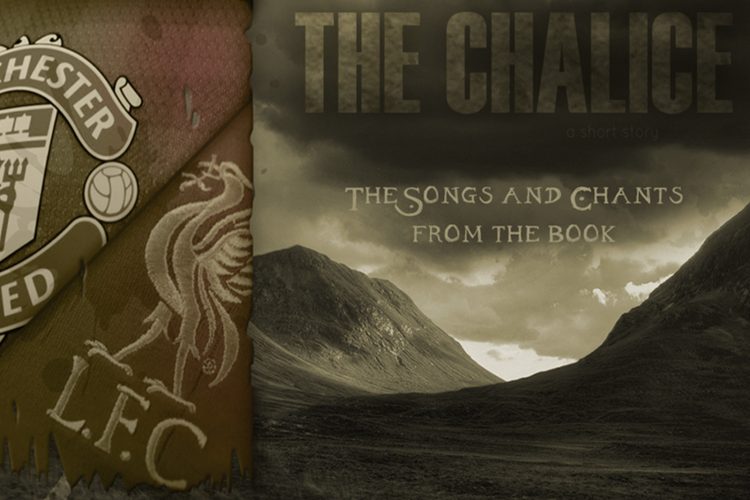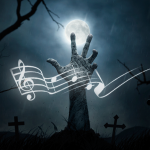I now realise, much to my chagrin, that I should have included reference to the tunes that the songs within The Chalice made use of.
Those that follow “the beautiful game” (football to all you heathens) will already know the songs that are frequently sung around the various grounds. For those that have no prior knowledge of the songs sung within football, I feel I should give some indication as to the tune associated with them. I know from past experience, seeing a song within a book can often be frustrating, especially if you don’t know how the tune goes. It is a vital piece of the story and unfortunately, I failed in that aspect.
So, for any readers out there that are wondering what the two main songs from The Chalice sound like, here you go…
“You’ll Never Walk Alone”
music & lyrics by Richard Rodgers and Oscar Hammerstein
Although originally written for the musical, Carousel (1945), the more famous version was released by Jerry & the Pacemakers in 1963. The song was quickly adopted by Liverpool FC not long afterwards.
The video shows the now-legendary comeback by Liverpool during the 2005 UEFA Champions League Final at the Atatürk Stadium in Istanbul, Turkey. Even though I don’t support Liverpool, the game was fantastic to watch!
“The Red Flag”
lyrics by Jim Connell
This song was originally written by the Irish journalist and political activist, Jim Connell, in December 1889. Connell was inspired to write a socialist anthem after attending a lecture at a meeting of the Social Democratic Federation (SDF) during the London Dock Strike of 1889.
The Red Flag has been modified and reused many times and is a song associated with left-wing politics, in particular with socialism. Within football, however, the lyrics were altered in tribute to the victims that died in the 1958 Munich air tragedy.
On their way home from a European Cup quarter-final victory against Red Star Belgrade, the aircraft carrying the Manchester United players, officials and journalists crashed while attempting to take off after refuelling in Munich, Germany. The Munich air disaster of 6 February 1958 claimed 23 lives, including those of eight players – Geoff Bent, Roger Byrne, Eddie Colman, Duncan Edwards, Mark Jones, David Pegg, Tommy Taylor and Billy Whelan – and injured several more.
The song itself, no matter the change in lyrics, is sung to the tune of the Christmas carol, O Tannenbaum. If you hum that as you read the song in the book then you’ll know what I was humming when I was writing.
Below are two video clips. The first is the player’s entrance at Old Trafford for the 50th anniversary of the Munich air tragedy. If you never saw it then it’s worth watching the entire clip, however, for those just interested in the tune you may want to skip to 0:51 where the song starts and watch until the players reach the pitch (after the piper has led them out). Sadly, Manchester United lost the game to rivals Manchester City 1-2.
The second clip is shorter and unfortunately only includes the end of the song (that is most commonly sung at some games). It’s good nonetheless.











I’m not a supporter, but being Italian I’m also not insensitive to what happenes in stadiums… both good an bad.
Didn’t know about the Manchester tragedy of 1958. How strange. Something very similar happened to an Italian team in 1949. The Grande Torino was flying back from Spain, after a friendly match with Belfica. The plain crashed against the back wall of the Superga Cathedral. 31 victimes, including the entire team.
We still remember it.
So you don’t support the “Mussi Volanti”? 😉
Indeed, football can bring out the very best and the very worst. Being Italian, you’ll probably know well the issues with the Ultras (particularly the heavily right-wing S.S. Lazio).
I’m pleased to say English football has largely moved on from the hooliganism prevalent during the 80’s, but violence in football still exists throughout parts of Europe, especially Eastern Europe, Russia, and Africa (as recently seen during the African Cup of Nations).
Sadly, the game itself is brought into disrepute as it is used as the battleground for the religious, racial, or political beliefs of the ‘fan’ groups involved.
It’s interesting that you mention the Superga air disaster of 1949. As a Manchester United supporter I had previously looked at past disasters that had devastated fellow football clubs. At the time, Torino was leading Serie A with four games left in the season. The club carried on by fielding its youth team and in a sign of respect their opponents in each of these matches (Genoa, Palermo, Sampdoria, and Fiorentina) also fielded their youth sides. The youth team won each of the matches and the Scudetto.
It is in moments like these where the spirit of football and it’s supporters really shine.